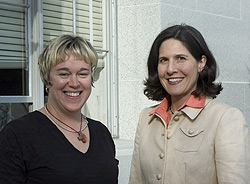Berkeleyan
Rainy-day women
Berkeley's government-affairs team strives to build relationships sturdy enough to withstand the occasional (and inevitable) public stoning
![]()
| 15 February 2006
"I always say that half of government-affairs work is a waste of time," quips Michelle Moskowitz. "You just never know which half."
Moskowitz, like her colleagues in Berkeley's ten-person Government and Community Affairs unit, subscribes to what might be called the insurance-premium theory of government outreach: Keep your payments up during the good times, because a crisis could be just around the bend.
 Chris Treadway (left) and Michelle Moskowitz (Deborah Stalford photo) |
For the campus's legislative advocates - they eschew the term "lobbyists" and aren't registered as such - the crisis this time is the executive-compensation controversy, which made a very public appearance in the state Capitol last week before the Senate Education Committee. The premiums are the team's unsung, week-by-week, year-after-year efforts to build relationships with legislators and their staffs in Sacramento and Washington, D.C., whether it's accompanying Chancellor Birgeneau to one-on-one meetings with key lawmakers or shepherding politicians around campus.
"Legislators want to hear from the campuses," explains Christine Treadway, who's in charge of Berkeley's state-level relations and is a familiar face in many Capitol offices. "The Office of the President, in their minds, is the bureaucrats. You need campuses to be constantly going up and establishing relationships with members and staff, to educate them about Berkeley's positions, what the mission of the UC system is overall, here are all the exciting things that are going on at Berkeley and why you should care, this is our contribution to the state."
| UC president acknowledges culpa-bility At the first of two Sacramento hearings on executive compensation, Robert Dynes pledges to exert more control. But state legislators insist on more than apologies and promises |
Until the executive-pay flap broke out in November, the group's outreach efforts focused on maintaining the lines of communication with state and federal officials, and promoting such campus priorities as the creation of a matching fund for scholarships for low-income students - modeled on a program at the University of Toronto, where Birgeneau served as president - and the granting of in-state tuition status to Native American students. With the publication of the San Francisco Chronicle's series on compensation packages for senior administrators, however, what had been the ever-present threat of crisis not only took shape, but cast its long shadow across the sprawling, 10-campus UC system.
"When you look back at November and December, Berkeley may not have been specifically under attack, but it was obviously of deep and abiding interest to us that the University of California not get sunk by this," recalls Kathleen Moazed, Berkeley's executive director of government and community affairs. "First, we care desperately that the system come out of this okay. But we also recognized that Birgeneau and other chancellors could be very effective in these one-on-one conversations with legislators. When they sat there face-to-face with the chancellor and had him explain the academic marketplace in which he has to compete for the top talent, it was very effective."
Birgeneau, she adds, "really understands the value of government affairs. He understands that he needs to be the face of Berkeley in Sacramento and in Washington."
UC President Robert Dynes took considerable heat at last week's hearing for, among other things, the lack of transparency in the system's compensation practices, and the Office of the President has been criticized for a late and lackluster response to the pay disclosures. Treadway, however, notes that there was an early effort by UCOP to enlist campuses to reach out to state legislators from their districts, "to give them as much information as we possibly could to try to explain our story and put it into context."
"They need to use the personal relationships that other people have with members, to put a face on this issue, to get full disclosure and transparency, if you will, from the leaders of these campuses - the chancellors coming up and saying, what do you need to know, we don't have anything to hide, we want to be responsive," explains Treadway.
"For us, in fighting the PR battle, my position is we get in front, give them the information, so if someone calls their office outraged, they can immediately say, 'You know, I talked to the university, this has been blown out of proportion, here's the accurate information.' It defuses the situation."
Anyone watching last week's hearing might be forgiven for wondering if the situation was, in fact, defused. But while there are no metrics for success in government relations - and while it's widely expected UC will incur some form of punishment for its transgressions - Moazed, Moskowitz, and Treadway believe their ongoing, behind-the-scenes spadework is making a significant difference for Berkeley.
"To be honest, it didn't matter how much groundwork had been done, because that was a public hearing, these are public officials who are running for office, and they need to be tough," says Moazed. "And it's also their oversight responsibility. It's Gloria Romero's responsibility to find out, how the hell did these things happen? What is the policy, and who's answering for it?"
The real objective, she explains, is "bringing down the temperature, and lowering the demand for punitive action. We have to go to these painful hearings, we have to be open and honest and show that we're actually changing in all these different ways, and hope that by the end of the day we can have a constructive conversation on limiting how much of a punitive exercise it's going to be."
Meanwhile, she adds, "We have a bigger picture. The reason that we work here is to broaden the members' appreciation of what we do here at Berkeley, and to deepen their understanding of what we're all about."

